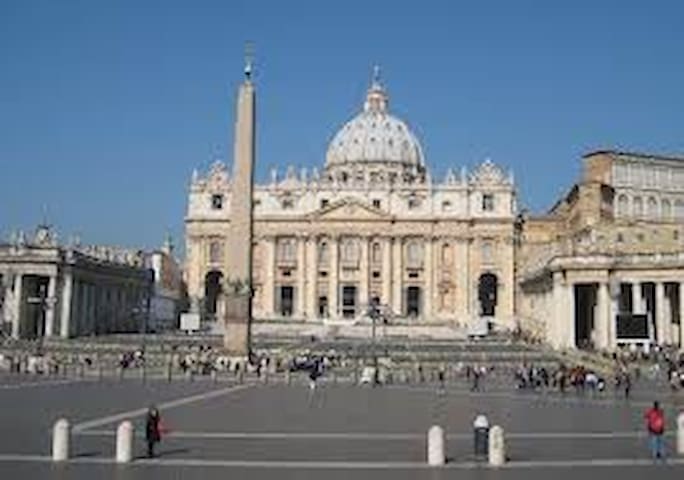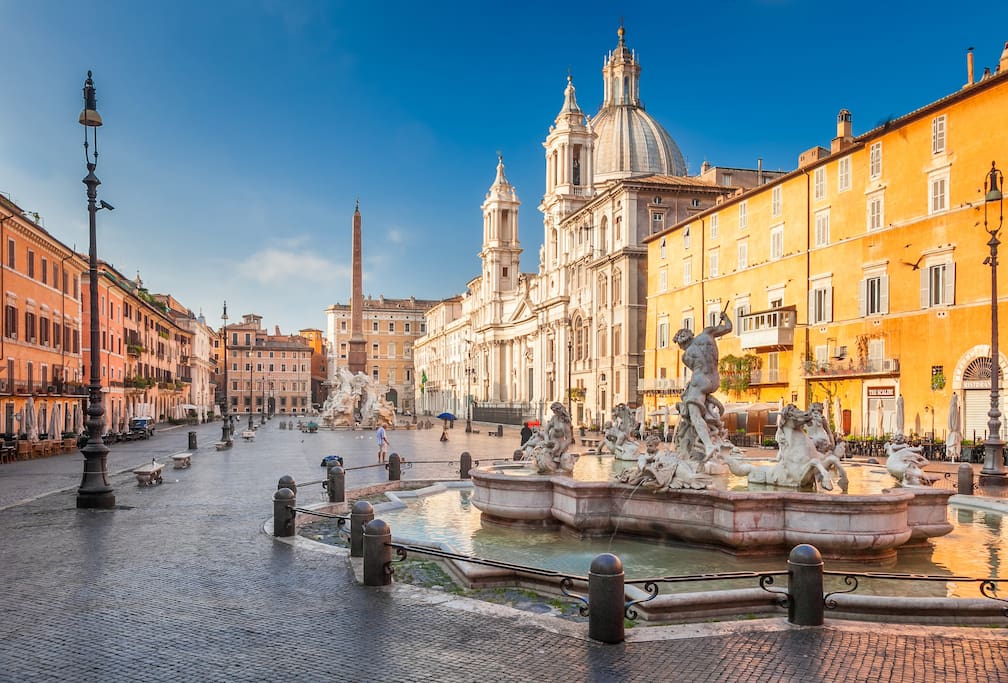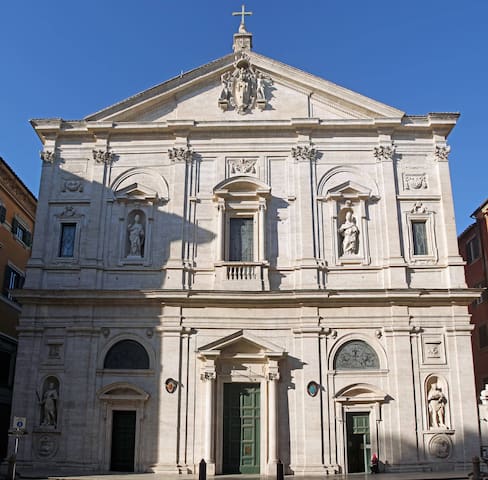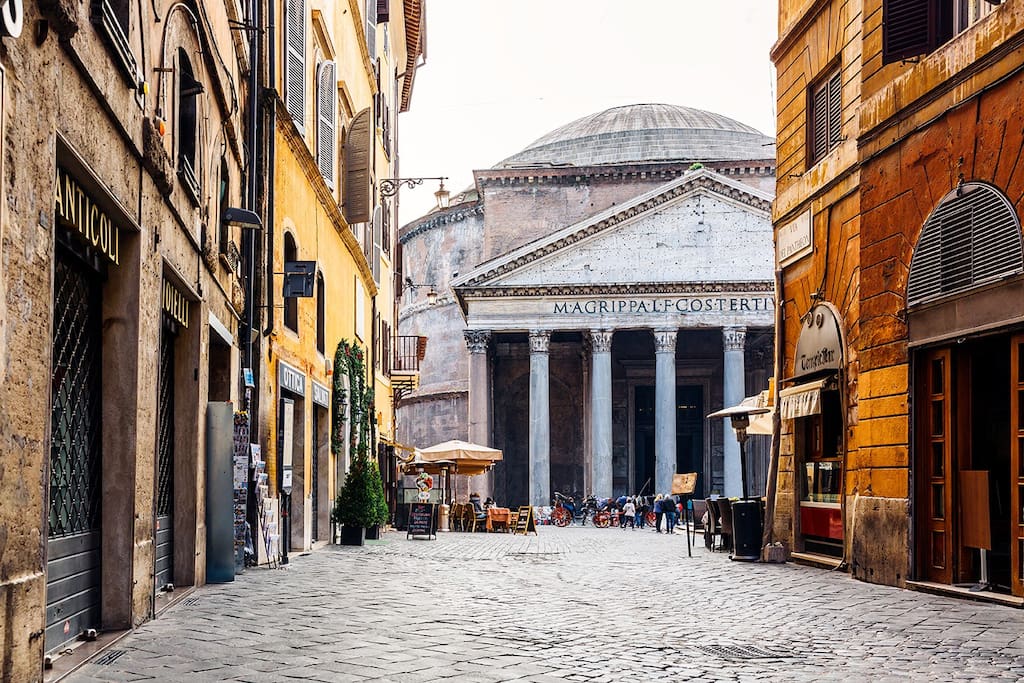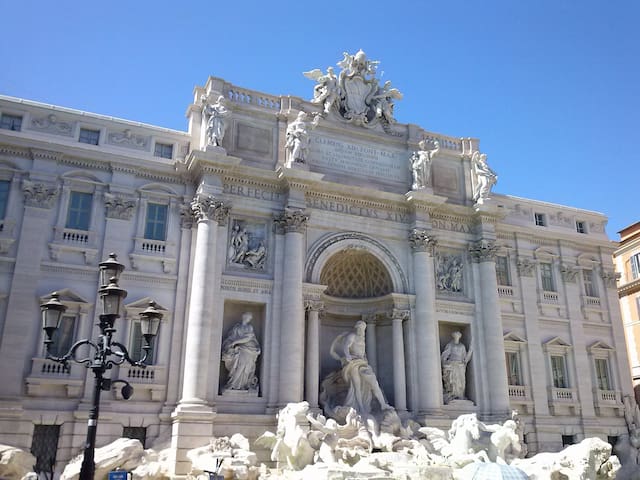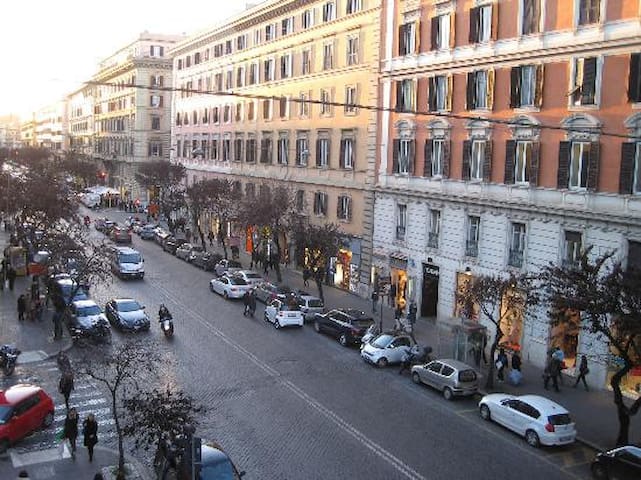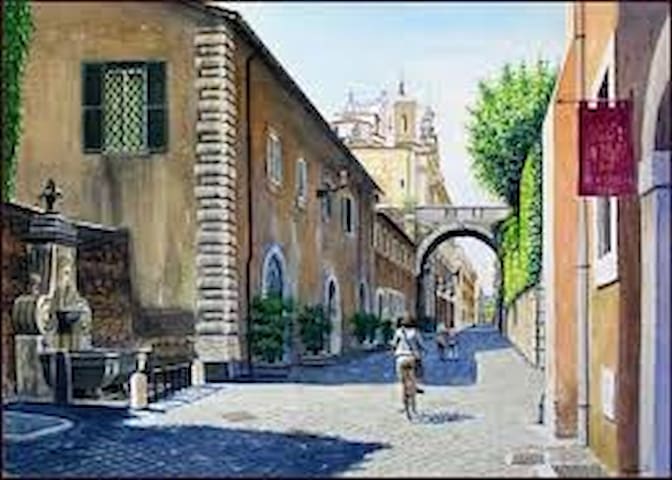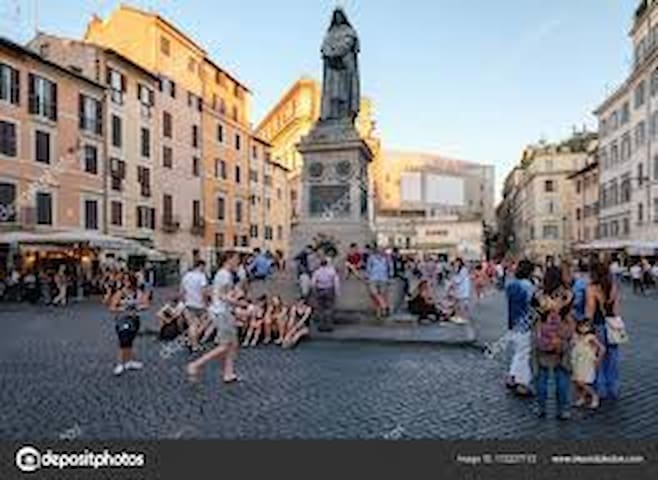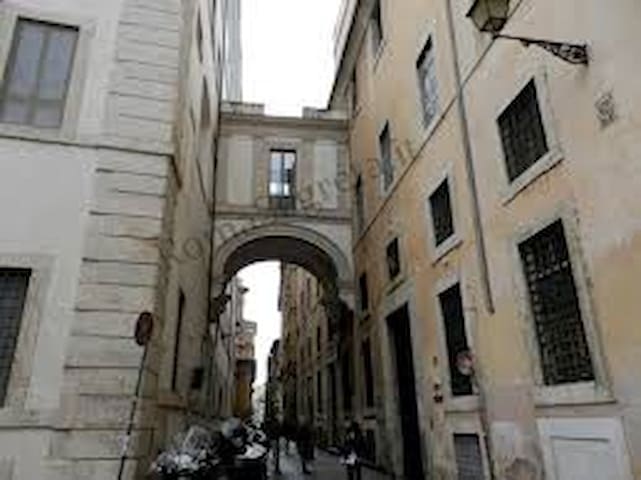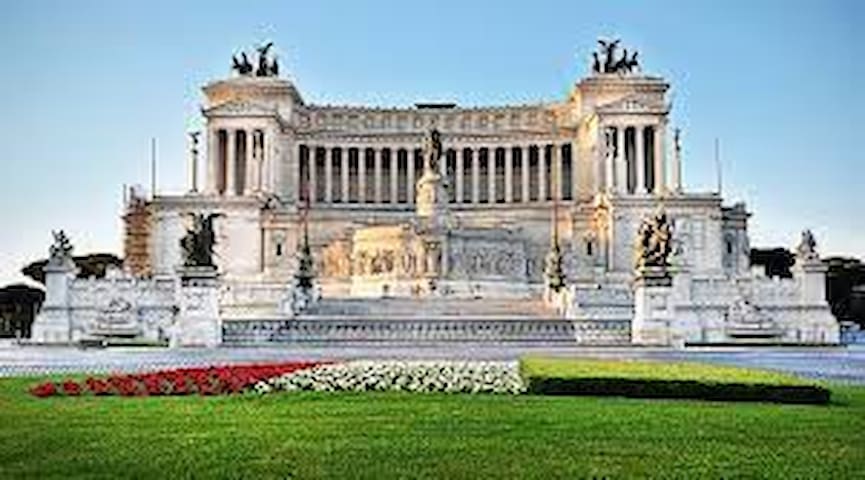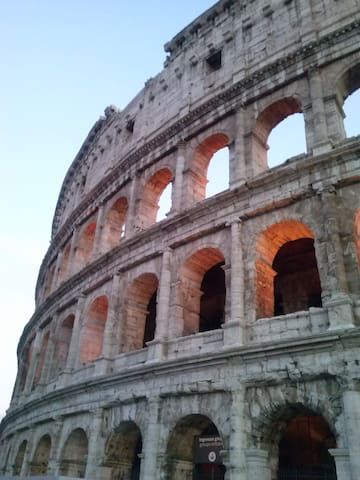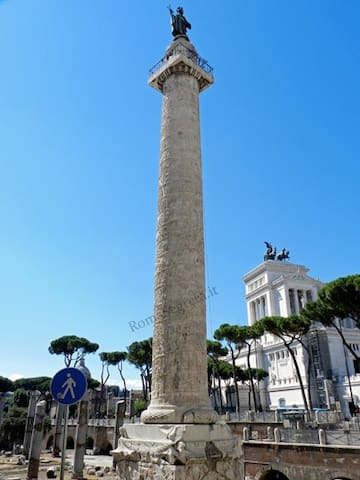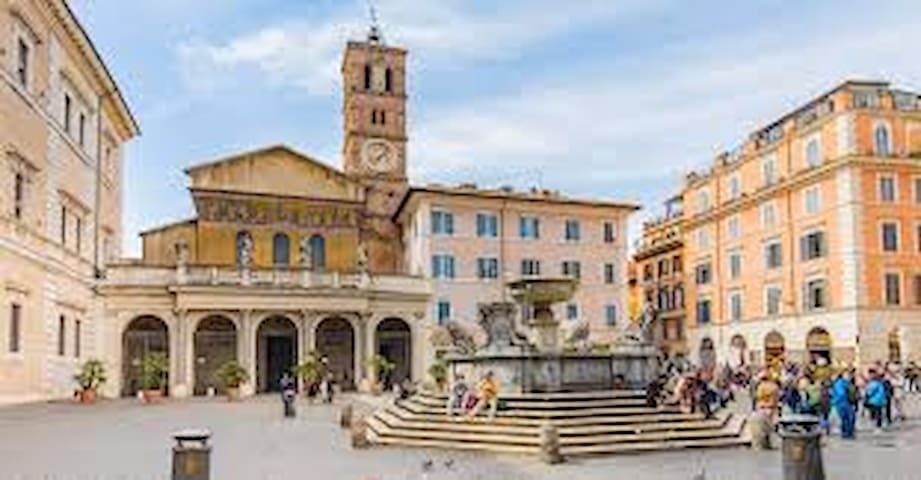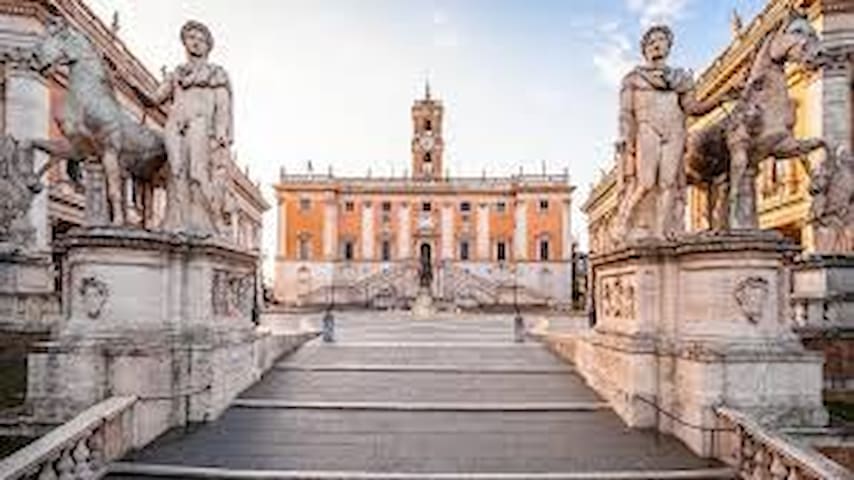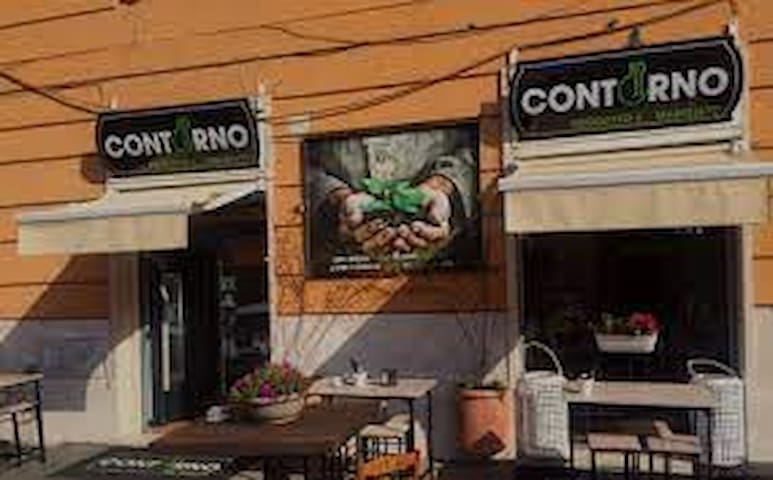Every corner of Roma tells a long history. In my guide I tell you only a little bit
Daniela
Places to visit
Most important historical sites to visit
5 minutes of walk from home, Piazza San Pietro with the gorgeous Basilica. Inside the church, 2 masterpieces of Michelangelo : the Pietà and the Mosè
59 habitants recommandent
St. Peter's Basilica
Piazza San Pietro5 minutes of walk from home, Piazza San Pietro with the gorgeous Basilica. Inside the church, 2 masterpieces of Michelangelo : the Pietà and the Mosè
5 minutes of walk from home. You can visit the Castle also inside with or without guide. In ancient times, in case of danger of siege to the Vatican the popes took refuge in the castle through the passage called "Passetto". The "Passetto is about 800 meters long, you can see it right next to home and if you visit inside the Castle, you can walk on it.
1219 habitants recommandent
Château Saint-Ange
50 Lungotevere Castello5 minutes of walk from home. You can visit the Castle also inside with or without guide. In ancient times, in case of danger of siege to the Vatican the popes took refuge in the castle through the passage called "Passetto". The "Passetto is about 800 meters long, you can see it right next to home and if you visit inside the Castle, you can walk on it.
15 minutes of walk from home. Baroque square. In ancient Roman times, it was the Stadium of Domitian which was built by Emperor Domitian in 85 AD to serve the Greek athletic games. In the 3rd century was restored
1722 habitants recommandent
Place Navone
Piazza Navona15 minutes of walk from home. Baroque square. In ancient Roman times, it was the Stadium of Domitian which was built by Emperor Domitian in 85 AD to serve the Greek athletic games. In the 3rd century was restored
Between Piazza Navona and Pantheon. In this churc you can admire 3 masterpieces of our painter "Caravaggio"
150 habitants recommandent
Church of St. Louis of the French
Piazza di San Luigi de' FrancesiBetween Piazza Navona and Pantheon. In this churc you can admire 3 masterpieces of our painter "Caravaggio"
10 minutes of walk from Piazza Navona. The Pantheon (temple of all gods) is a building of ancient Rome built as a temple dedicated to all past, present and future divinities. It was founded in 27 BC
1342 habitants recommandent
Panthéon
Piazza della Rotonda10 minutes of walk from Piazza Navona. The Pantheon (temple of all gods) is a building of ancient Rome built as a temple dedicated to all past, present and future divinities. It was founded in 27 BC
10 minutes of walk from Pantheon. The Trevi Fountain is the largest and one of the most beautiful and famous fountains in Rome. It was built on the facade of Palazzo Poli. The water was brought to the area by the ancient Romans who built an aqueduct 20 kilometers long from the "Aniene" river
1461 habitants recommandent
Fontaine de Trevi
Piazza di Trevi10 minutes of walk from Pantheon. The Trevi Fountain is the largest and one of the most beautiful and famous fountains in Rome. It was built on the facade of Palazzo Poli. The water was brought to the area by the ancient Romans who built an aqueduct 20 kilometers long from the "Aniene" river
5 minutes of walk from Trevi Fountain is "Piazza di Spagna" (Spanish Steps) and the steps of "Trinità dei Monti" At the top of the stairs, walking towards left, you will reach the "Pincio" and "Villa Borghese". Around Piazza di Spagna, the most important streets for shopping (Via Condotti, Via Borgognona, Via Frattina, Via della Vite, Via del Corso etc) where also the high couture shops are. And Via Margutta, the street of painters
206 habitants recommandent
Escalier espagnol
Piazza di Spagna5 minutes of walk from Trevi Fountain is "Piazza di Spagna" (Spanish Steps) and the steps of "Trinità dei Monti" At the top of the stairs, walking towards left, you will reach the "Pincio" and "Villa Borghese". Around Piazza di Spagna, the most important streets for shopping (Via Condotti, Via Borgognona, Via Frattina, Via della Vite, Via del Corso etc) where also the high couture shops are. And Via Margutta, the street of painters
The "Pincio" is inside "Villa Borghese", one of the most important parks of Roma. You can relax inside the gardens, watch Roma from here and reach the museum Galleria Borghese which is inside this park
259 habitants recommandent
Promenade Pincio
Viale Gabriele D'AnnunzioThe "Pincio" is inside "Villa Borghese", one of the most important parks of Roma. You can relax inside the gardens, watch Roma from here and reach the museum Galleria Borghese which is inside this park
Piazza del Popolo, at the foot of the Pincio, with the 2 twin churches and the obelisk in the center of the Piazza. If you are not tired, keep walking towards "Via Cola di Rienzo" (shopping area) crossing the bridge over the Tiber river, otherwise take the metro at Piazzale Flaminio (right next to Piazza del Popolo, beyond the arches) and get off at the "Ottaviano" stop (600 meters far from home)
797 habitants recommandent
Place du Peuple
Piazza del PopoloPiazza del Popolo, at the foot of the Pincio, with the 2 twin churches and the obelisk in the center of the Piazza. If you are not tired, keep walking towards "Via Cola di Rienzo" (shopping area) crossing the bridge over the Tiber river, otherwise take the metro at Piazzale Flaminio (right next to Piazza del Popolo, beyond the arches) and get off at the "Ottaviano" stop (600 meters far from home)
Mausolée d'Auguste
Piazza Augusto ImperatoreVia Cola di Rienzo
Via Cola di RienzoA long street where shopping is done
10 minutes of walk from home. In the Rione Regola, it was built by Bramante in the early 1500s, during the period in which the architect carried out the works for the Basilica of San Pietro. 1 km long, there are the Mascherone fountain, the Arco Farnese and 4 churches. Very nice to walk around the alleys for reach Campo de Fiori
64 habitants recommandent
Via Giulia
10 minutes of walk from home. In the Rione Regola, it was built by Bramante in the early 1500s, during the period in which the architect carried out the works for the Basilica of San Pietro. 1 km long, there are the Mascherone fountain, the Arco Farnese and 4 churches. Very nice to walk around the alleys for reach Campo de Fiori
it owes its name to the daisies, poppies, and meadow flowers that once adorned the square. Typical, the market that takes place every morning since ancient times. The square was not only a place of business or pleasure, but also a place of capital executions. At the center of the square stands the statue of the philosopher Giordano Bruno, burned at the stake for heresy on February 17th 1600 at this point. Now it is also a place of night life
383 habitants recommandent
Piazza Campo de' Fiori
Campo de' Fioriit owes its name to the daisies, poppies, and meadow flowers that once adorned the square. Typical, the market that takes place every morning since ancient times. The square was not only a place of business or pleasure, but also a place of capital executions. At the center of the square stands the statue of the philosopher Giordano Bruno, burned at the stake for heresy on February 17th 1600 at this point. Now it is also a place of night life
Campo de' Fiori
Campo de' Fioriit take its name from the craftsmen and merchants of gipponi, called gipponari, or weavers of bodices. The road belongs to three districts: Rione Parione, Rione S. Eustachio and Rione Regola. Numerous are the clothing shops. Take a stop at "Il Filettaro" (88, Largo dei Librari) to taste his famous fried cod
6 habitants recommandent
Via dei Giubbonari
Via dei Giubbonariit take its name from the craftsmen and merchants of gipponi, called gipponari, or weavers of bodices. The road belongs to three districts: Rione Parione, Rione S. Eustachio and Rione Regola. Numerous are the clothing shops. Take a stop at "Il Filettaro" (88, Largo dei Librari) to taste his famous fried cod
The Jewish ghetto of Rome is among the oldest ghettos in the world. In the background the Portico d’Ottavia: a Roman monument built in 146 BC. In the following years it was renovated and enlarged several times and the remains that can be seen today date back mostly to the 203 AD From the Middle Ages until the end of the 1800s there was the main fish market in the city. Many restaurants with Jewish-Roman cuisine to taste and Kosher pastry shops
111 habitants recommandent
Portique d'Octavie
29 Via del Portico d'OttaviaThe Jewish ghetto of Rome is among the oldest ghettos in the world. In the background the Portico d’Ottavia: a Roman monument built in 146 BC. In the following years it was renovated and enlarged several times and the remains that can be seen today date back mostly to the 203 AD From the Middle Ages until the end of the 1800s there was the main fish market in the city. Many restaurants with Jewish-Roman cuisine to taste and Kosher pastry shops
The Campidoglio, is the smallest of the seven hills of Rome and is the hill on which Rome was founded. The Campidoglio is also the seat of the municipality of Rome. It was designed by Michelangelo in the sixteenth century. At the center of the trapezoidal square is the statue of Marcus Aurelius. The square is surrounded by three palaces: the Palazzo Nuovo, the Palazzo Senatorio and the Palazzo dei Conservatori. The three house the Capitoline Museums, a very rich collection of finds from ancient Rome.
185 habitants recommandent
Campidoglio
Piazza del CampidoglioThe Campidoglio, is the smallest of the seven hills of Rome and is the hill on which Rome was founded. The Campidoglio is also the seat of the municipality of Rome. It was designed by Michelangelo in the sixteenth century. At the center of the trapezoidal square is the statue of Marcus Aurelius. The square is surrounded by three palaces: the Palazzo Nuovo, the Palazzo Senatorio and the Palazzo dei Conservatori. The three house the Capitoline Museums, a very rich collection of finds from ancient Rome.
Piazza Venezia is located at the foot of the Capitol, where the most important streets of the capital intersect, as Via dei Fori Imperiali and Via del Corso. The Vittoriano stands out, a colossal monument to Vittorio Emanuele II, also called the Altar of the Fatherland. Many are the historical palaces in the square. It is possible to go up to the panoramic terrace of the Vittoriano.
576 habitants recommandent
Piazza Venezia
Piazza Venezia is located at the foot of the Capitol, where the most important streets of the capital intersect, as Via dei Fori Imperiali and Via del Corso. The Vittoriano stands out, a colossal monument to Vittorio Emanuele II, also called the Altar of the Fatherland. Many are the historical palaces in the square. It is possible to go up to the panoramic terrace of the Vittoriano.
The Colosseum or Amphitheatrum Flavium is the largest amphitheater in the world, capable of containing an estimated number of spectators between 50,000 and 75,000 units. Its construction was started by Vespasian in 72 AD. The name "Colosseum" only spread in the Middle Ages. In ancient times it was used for gladiatorial shows and other public events (hunting shows, re-enactments of famous battles, and dramas based on classical mythology). The tradition that wants it to be a place of martyrdom of Christians is groundless. The entrance ticket is valid for 2 days, costs 12.00 euro and allows to visit the Colosseum, the Roman Forum and the Palatine Hill.
2612 habitants recommandent
Colisée
1 Piazza del ColosseoThe Colosseum or Amphitheatrum Flavium is the largest amphitheater in the world, capable of containing an estimated number of spectators between 50,000 and 75,000 units. Its construction was started by Vespasian in 72 AD. The name "Colosseum" only spread in the Middle Ages. In ancient times it was used for gladiatorial shows and other public events (hunting shows, re-enactments of famous battles, and dramas based on classical mythology). The tradition that wants it to be a place of martyrdom of Christians is groundless. The entrance ticket is valid for 2 days, costs 12.00 euro and allows to visit the Colosseum, the Roman Forum and the Palatine Hill.
In ancient times the Forum was a marshy area. Only from the end of the 7th century BC, after the reclamation of the valley, did the Roman Forum begin to take shape destined to remain the center of public life for over a millennium.
422 habitants recommandent
Forum romain
5/6 Via della Salara VecchiaIn ancient times the Forum was a marshy area. Only from the end of the 7th century BC, after the reclamation of the valley, did the Roman Forum begin to take shape destined to remain the center of public life for over a millennium.
Trajan Column
Foro TraianoThe Palatine is one of the seven hills of Rome. There are preserved the remains of the Iron Age settlements related to the most ancient nucleus of the city of Rome. Seat of important citizen cults, between the II and I century BC the hill became the residential district of the Roman aristocracy, with refined residences characterized by exceptional pictorial and floor decorations. After Augustus, who symbolically chose the hill as a place for his own home, the Palatine became the seat of the imperial palaces.
186 habitants recommandent
Palatine Hill
Via SacraThe Palatine is one of the seven hills of Rome. There are preserved the remains of the Iron Age settlements related to the most ancient nucleus of the city of Rome. Seat of important citizen cults, between the II and I century BC the hill became the residential district of the Roman aristocracy, with refined residences characterized by exceptional pictorial and floor decorations. After Augustus, who symbolically chose the hill as a place for his own home, the Palatine became the seat of the imperial palaces.
Old and picturesque district for evening and dinner. Many restaurants and very nice walking along the old little streets that we call "vicoli"
1330 habitants recommandent
Trastevere
Old and picturesque district for evening and dinner. Many restaurants and very nice walking along the old little streets that we call "vicoli"
from Trastevere walk up on Gianicolo, one of the 7 hills of Roma and relax you with a great view of Roma
363 habitants recommandent
Terrasse Janicule
Salita di Sant'Onofriofrom Trastevere walk up on Gianicolo, one of the 7 hills of Roma and relax you with a great view of Roma
Museum
Musées du Vatican
Louve du Capitole
1 Piazza del CampidoglioTo visit the "Capitolini Museum"
Louve du Capitole
1 Piazza del CampidoglioGalerie Borghèse et Musée
5 Piazzale Scipione BorghesePalazzo Barberini
12 Piazza Giacomo MatteottiMusée de l'Ara Pacis
Lungotevere in AugustaGalerie nationale d'art moderne et contemporain
131 Viale delle Belle ArtiMAXXI - Musée national d'art du XXIe siècle
4a Via Guido ReniMusée national romain - Thermes de Dioclétien
78 Viale Enrico de NicolaOfferta gastronomica
Carrefour Express
10 Via di Porta CastelloSupermarket 40 meters far away
Borghiciana Pastificio Artigianale
186 Borgo PioPasta super
L'arena Sto Gelato
1 Borgo PioIce cream
Mordi Sandwichouse
181A Borgo PioLa Zanzara
84 Via CrescenzioAperitivi
Ristorante Arlù
135 Borgo PioScialla The Original Street Food
27 Vicolo del FarinoneHedera
179 Borgo Piobreakfast, ice cream
Contorno Self Bistrot
34 Via Giovanni VitelleschiVery nice buffet food
Restaurants
Da Romolo
12 Vicolo del CampanileVery good
Osteria Nuvolari
10 Via degli OmbrellariVery nice food

